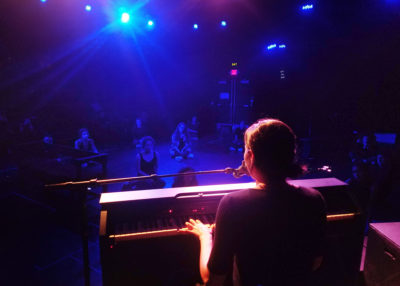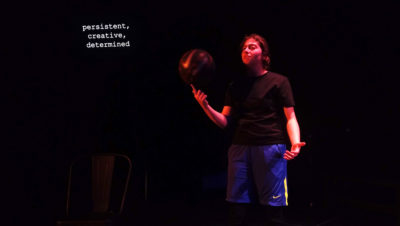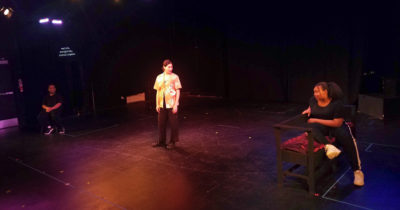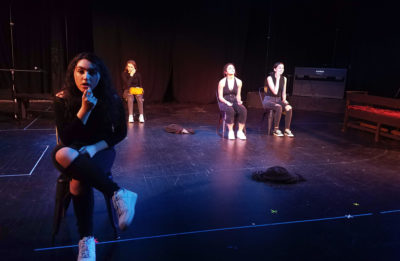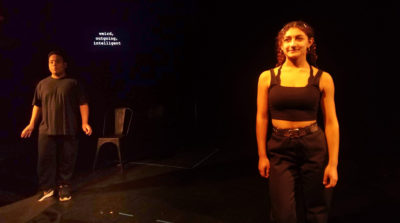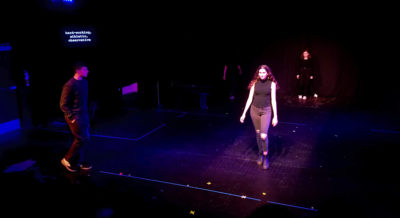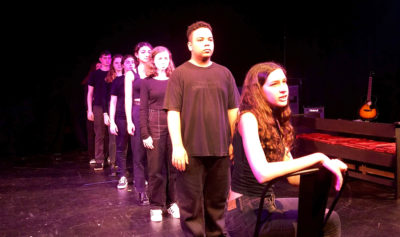For the past forty years, the 10th grade Drama 2 class at Oakwood has explored one-act plays. This would begin by reading examples and studying the form, followed by acting them out, finally selecting 10-15 plays to present in a culminating one-act festival at the end of the term. That all changed this year.
It’s Kind of Weird to Say I’m Beautiful
“I was really impressed with how hungry and passionate the students were for the work, which is rare to find as a class, everyone being on board,” says theater teacher and Director Javier Rivera, who helmed the 40th-anniversary One Act showcase last year, his first at Oakwood.
“I like to try new things. I’m a theater artist and director so I wanted to challenge myself,” and challenge the students as well.
That challenge was a shift from the one acts toward docudrama, or documentary theatre, a dramatic form that relies solely on the words of real people in real life, taken verbatim from transcripts of interviews, as its script. The form has been popularized by playwright and actress Anna Deavere Smith, who—in addition to mainstream roles on television’s The West Wing and Nurse Jackie—has used docudrama to explore issues ranging from the 1992 Los Angeles Uprising to the crisis in the American healthcare system.
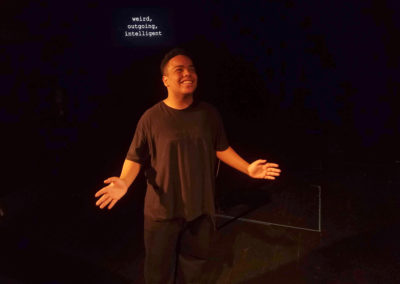
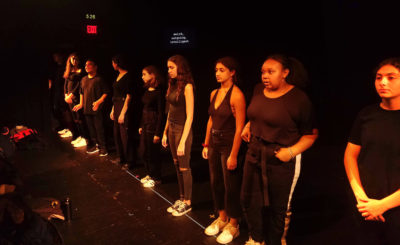
“I think it’s not only untraditional for a high school drama class, in general, to be doing this kind of production,” says student Lauren, “but even at Oakwood, which is kind of an untraditional place, we’ve never done this before.”
To familiarize the class with docudrama, Javier assigned students monologues from each of Deavere Smith’s one-woman plays, allowing them to take on the roles of actual people through their own words, from the Rev. Al Sharpton to Gloria Steinem to Bill Clinton. “The challenge is to embody these people and give breadth and depth to their words,” says Javier. “We’re not imitating or mimicking. We’re finding ourselves in those roles, finding the rhythm of these people in our own rhythm.”
“I didn’t have too much prior experience with one acts, but I had even less knowledge of what a docudrama was, “ says student Cooper. “In terms of enjoyment, it was very high, but I was incredibly thrown off guard.”
The class was then tasked with creating their own monologues through the Donor Project, which involved picking a teacher at Oakwood who would “donate” their story. Each student interviewed their chosen teacher, taking note not only of their words but how their face, head, and body moved as they spoke. The teachers were invited to attend a performance of the monologues, which made some students nervous.
We don’t often ask our teachers: ‘How are you doing?’ ‘What led to that choice you made?’ ‘How are you the way that you are?’…These are people’s lives, their burdens, that we were asking them to share with us.
Lauren, 10th Grade“My kids asked, ‘Aren’t the teachers going to be insulted because we’re imitating them?’” recalls Javier. “I said, ‘You’re not imitating them, you’re becoming them. If they laugh, it’s not because you’re mocking, it’s because there’s recognition there.’”
Their first original monologues under their belts, the class then set out to create an entire ensemble production based on the docudrama, selecting interview subjects from amongst the teachers, faculty, and students that make up the Oakwood community.
“It was interesting to sit down with faculty that you hadn’t known before and listen to these very personal, intimate stories,” recalls Lauren. “Those are unheard voices. We don’t often ask our teachers: ‘How are you doing?’ ‘What led to that choice you made?’ ‘How are you the way that you are?’ It got really intense during some points. These are people’s lives, their burdens, that we were asking them to share with us.”
Kiana, another student in the class, noted the challenges inherent in the interview, navigating between curiosity and sensitivity. “We knew the interviews were going to be our script so we wanted as much deep stuff as possible, but at the same time, these are people we respect so we needed to know when to stop,” she says.
Kiana had had good practice with her first subject for the Donor Project, Melissa Berton, the Oakwood teacher who recently won an Oscar for the documentary film “Period. End of Sentence.” which she produced with Oakwood students.
Based on the content of those interviews, the students came up with a theme—self-image—that would form the through-line connecting all of their monologues, and a title “It’s Kind of Weird to Say I’m Beautiful,” a line taken verbatim from one of the interviews.
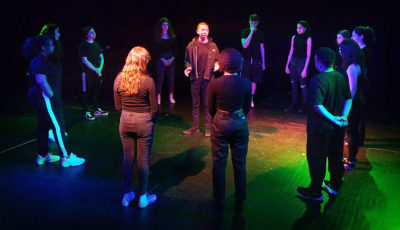
Not content to rely simply on the monologues, Javier had the students turn one of their interviews into poems, which were then turned into songs, four of which were featured in the final production. Two students from outside the class, 9th grader Chae and 12th grader Nick, contributed one song each, lending their own musical interpretations to the interviewees’ words.
Although not everyone in the class had a musical background, Javier pushed them to rise to the challenge. “Javier dropped a bomb, telling us, ‘if you’re not a singer, now is your time to do it,’” recalls Lauren.
On March 9th & 10th, after months of reading, interviewing, and rehearsing, the curtain came up on “It’s Kind of Weird to Say I’m Beautiful.” The Oakwood students, parents, and faculty who attended saw their words and experiences presented back to them, woven into a composite narrative of word and song. After the performances, Javier said he received feedback from some students who had been moved by the play, who felt their experiences and stories had been seen and honored, for perhaps the first time. For Javier, the audience’s reaction was only part of the play’s success.
“A lot of the students really didn’t trust the process. When you’re in the middle of something, you may have a hard time seeing it,” he recalls. “It was important to know that repetition is the death of art. Now they see the value of trying something new and different. They realize the power of good theater.”


